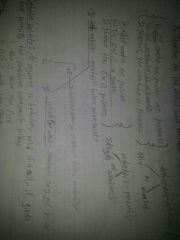![]()
![]()
![]()
Use LEFT and RIGHT arrow keys to navigate between flashcards;
Use UP and DOWN arrow keys to flip the card;
H to show hint;
A reads text to speech;
17 Cards in this Set
- Front
- Back
|
Argument construction
|
1) point is expressed
2) reasons are given group of statements, one is said to follow from the others construction: -premises |inference - relationship between them -conclusion -indicator words for conclusion and premises |
|
|
Argument form
|
1. premise (1)
2. premise (2) ~~~~~~~~~~~~ 3. conclusion 1)All humans are mortal 2) Socrates is human ~~~~~~~~~~~~~~~~~~~ 3)Socrates is human |
|
|
Enthymemes
|
an argument that is missing premises or conclusion
|
|
|
Principle of Charity
|
interpreting a speaker's statement to be rational and considering it's best, strongest possible interpretation
|
|
|
Requirements of good reasoning
|
1) Accurate information
2) Strong connection between premises and conclusion good argument: one in which -a) given the premises, the conclusion follows from them with either deductive validity or inductive strength, and b) the premises are true -DU and IS are two different standards of inferential strength -(a) and (b) are logically independent from one another |
|
|
deductive validity
|
An argument is deductively valid if and only if, given true premises, the conclusion necessarily follows
deduction / \ / \ valid invalid |
|
|
inductive strength
|
given the premises are true, the conclusion follows PROBABLY; it is more likely to be true then not
induction / \ / \ strength weakness |
|
|
True premises requirements
|
the premises must be true for the argument to be valid.
|
|
|
Deductive/Inductive diagram
|

|
|
|
Logical form: Syllogism
|
3 line argument consisting of :
(a) major premise (b) minor premise (c) conclusion 1) All A are B 2) All B are C ~~~~~~~~~~~ 3) therefore, all A are C |
|
|
Logical Form: Barbara
|
1) All A are B
2) All B are C ~~~~~~~~~~~ 3) All A are C |
|
|
Logical Form: Disjunctive Syllogism
|
argument using premises where there is an "either" option or "or"
1) A or B 2) Not A/ Not B ~~~~~~~~~~~~ 3) B/A |
|
|
Logical Form: Modus Ponens
|
conditional statement; "if...then" statement
1) If A then B 2) A ~~~~~~~~~~~ 3) B |
|
|
Logical Form: Modus Tollens
|
anticedent consequence
^ ^ 1) If A then B 2) Not B ~~~~~~~~~~~ 3) Not A |
|
|
Fallacy of Denying the Anticedent
|
1) If A then B. true
2) Not A. true ~~~~~~~~~~ 3) Not B. true. VALID |
|
|
Fallacy of Affirming the Consequent
|
1) If A then B
2) B ~~~~~~~~~~~ 3) A |
|
|
Fallacy of Undistributed Middle
|
Don't know they are related
1) All A are B ------------/ 2) All C are B----------/ ~~~~~~~~~~~ 3) All A are C |

